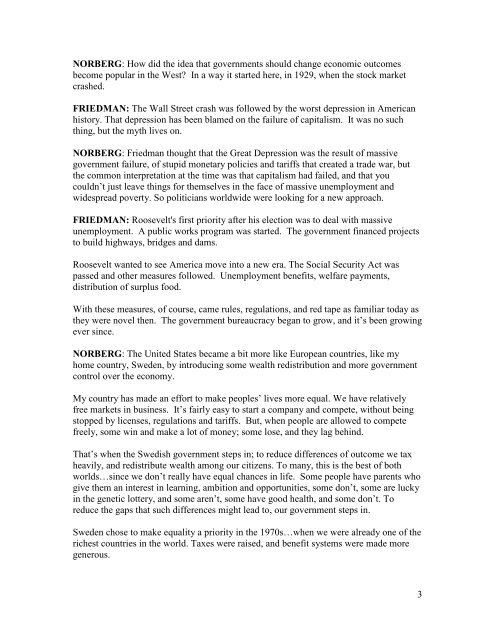Transcript - Izzit.org
Transcript - Izzit.org
Transcript - Izzit.org
You also want an ePaper? Increase the reach of your titles
YUMPU automatically turns print PDFs into web optimized ePapers that Google loves.
NORBERG: How did the idea that governments should change economic outcomes<br />
become popular in the West? In a way it started here, in 1929, when the stock market<br />
crashed.<br />
FRIEDMAN: The Wall Street crash was followed by the worst depression in American<br />
history. That depression has been blamed on the failure of capitalism. It was no such<br />
thing, but the myth lives on.<br />
NORBERG: Friedman thought that the Great Depression was the result of massive<br />
government failure, of stupid monetary policies and tariffs that created a trade war, but<br />
the common interpretation at the time was that capitalism had failed, and that you<br />
couldn’t just leave things for themselves in the face of massive unemployment and<br />
widespread poverty. So politicians worldwide were looking for a new approach.<br />
FRIEDMAN: Roosevelt's first priority after his election was to deal with massive<br />
unemployment. A public works program was started. The government financed projects<br />
to build highways, bridges and dams.<br />
Roosevelt wanted to see America move into a new era. The Social Security Act was<br />
passed and other measures followed. Unemployment benefits, welfare payments,<br />
distribution of surplus food.<br />
With these measures, of course, came rules, regulations, and red tape as familiar today as<br />
they were novel then. The government bureaucracy began to grow, and it’s been growing<br />
ever since.<br />
NORBERG: The United States became a bit more like European countries, like my<br />
home country, Sweden, by introducing some wealth redistribution and more government<br />
control over the economy.<br />
My country has made an effort to make peoples’ lives more equal. We have relatively<br />
free markets in business. It’s fairly easy to start a company and compete, without being<br />
stopped by licenses, regulations and tariffs. But, when people are allowed to compete<br />
freely, some win and make a lot of money; some lose, and they lag behind.<br />
That’s when the Swedish government steps in; to reduce differences of outcome we tax<br />
heavily, and redistribute wealth among our citizens. To many, this is the best of both<br />
worlds…since we don’t really have equal chances in life. Some people have parents who<br />
give them an interest in learning, ambition and opportunities, some don’t, some are lucky<br />
in the genetic lottery, and some aren’t, some have good health, and some don’t. To<br />
reduce the gaps that such differences might lead to, our government steps in.<br />
Sweden chose to make equality a priority in the 1970s…when we were already one of the<br />
richest countries in the world. Taxes were raised, and benefit systems were made more<br />
generous.<br />
3

















